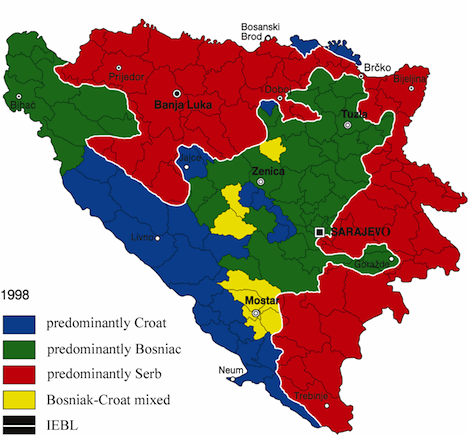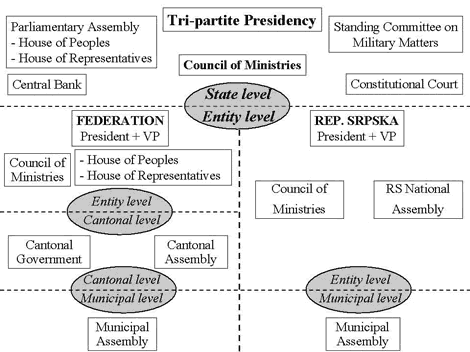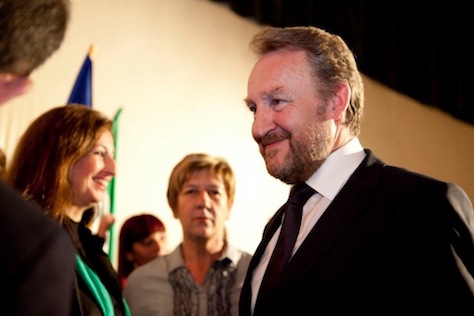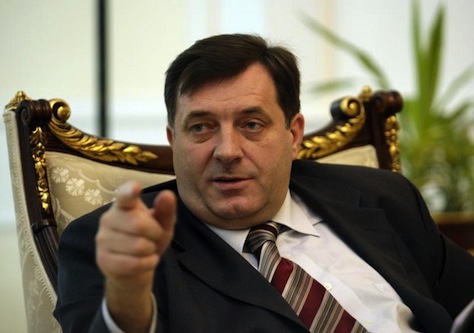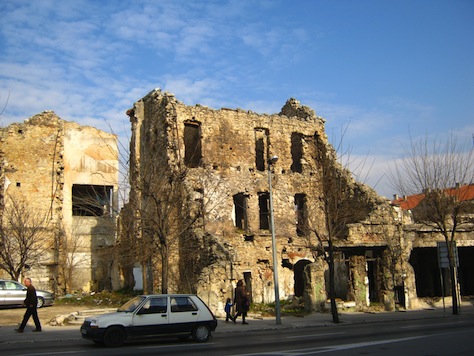 Photo credit to Brittany Ann of brittlichty.blogspot.com. Mostar in 2011.
Photo credit to Brittany Ann of brittlichty.blogspot.com. Mostar in 2011.
Bosnia and Herzegovina’s election system might not be the world’s most complex, but it vies with highly fragmented countries like Belgium and Lebanon for the honor.![]()
![]()
![]()
The difference is that Belgium is a wealthy country, and Lebanon, believe it or not, has an economy more than twice as large as the Bosnian economy ($45 billion versus around $17.5 billion) and a much higher GDP per capita ($10,000 versus around $4,600).
The country of Bosnia and Herzegovina quite literally cannot afford its system of government, which was always designed as a temporary structure as part of the Dayton accords that ended its civil war in 1995. More than two decades later, the country is staggering behind even its relatively poor Balkan neighbors, with a ridiculously high unemployment rate of 43.8%. Only Albania and war-forged Kosovo, which hasn’t even achieved universal recognition as a sovereign state, have lower standards of living.
Slovenia has been a member of the European Union for a decade and a eurozone member for five years, while Croatia gained EU membership last July. Serbia and Montenegro are in negotiations for EU accession, and Albania and Macedonia are at least official candidates, Bosnia and Herzegovina joins Kosovo (and Ukraine, Moldova and Georgia) as a merely potential candidate.
Bosnia’s not a hopeless cause. The Bosnian metal industry was the pride of the former Yugoslav republic, and its capital, Sarajevo, hosted the 1984 Winter Olympics. The country’s beauty, with the right infrastructure, could also yield greater tourism interest. Travelers shunning the well-worn path of tourist hotspots like Dubrovnik and Split (not to mention overcrowded Adriatic beaches) could turn to the Sarajevo’s nightlife or to untrammeled mountains and rivers.
* * * * *
RELATED: Bosnia-Herzegovina census highlights tripartite fractures and constitutional problems
RELATED: Will Bosnian protests be the
final straw for the Dayton accords?
* * * * *
The paralysis of Bosnian government should be apparent in the daunting series of elections that the country will endure on October 12.
Its national government is fragmented into a tripartite system, whereby each of the country’s three dominant ethnic groups each choose a president. Though it’s mostly ceremonial, the presidency ‘rotates’ every eight months. It’s important insofar as it elects to chair of the Council of Ministers, the day-to-day executive body of the country.
But it’s even more complex in the Bosnian context, because the two major subnational ‘entities’ of the country, the Federation of Bosnia and Herzegovina (populated chiefly by Bosniaks and Croats) and the Republika Srpska (populated chiefly by Serbs) each has its own president and parliament. Furthermore, the Federation of Bosnia and Herzegovina is further subdivided into 10 cantons, each of which will elect separate assemblies.
Each of the three ethnic groups has its own political parties that appeal to ethnic constituencies, in the same way that Flemish regional voters choose from among Flemish parties, not Belgian ones, or that Lebanese Maronite Christians or Sunni Muslims choose from among competing Maronite and Sunni factions.
In all three countries, that means that a truly national politics can never really emerge, and no truly national leaders can direct a coherent vision for economic, political and social policy.
The country also has a national bicameral parliament, which includes the Predstavnički Dom (House of Representatives), comprised of 42 members elected on the basis of proportional representation, 28 from the Federation of Bosnia and Herzegovina and 14 from the Republika Srpska. The upper chamber, the Dom Naroda (House of Peoples) has 15 members — five each for Bosniaks, Serbs and Croats.
Confused? Here’s a chart:
The combination of ethnicized politics and a weak national government has only amplified the country’s growing pains since the horrific ethnic cleansing and warfare of the early 1990s. Three levels of government and tripartite division among three ethnic groups results in a staggering amount of corruption, stagnation and economic inefficiency. All of those conditions were among the reasons that residents in Sarajevo took part, in February, in the most widespread anti-government protests since the war. Those were overshadowed by devastating floods in May, however.
Meanwhile, the country has had an internationally appointed ‘High Representative’ for the last two decades, created under the terms of the Dayton Accords, whose job it is to knock heads around when the country’s national leaders can’t agree on policy. Former Swedish foreign minister and prime minister Carl Bildt served as the first high representative from 1995 to 1997, and longtime UK Liberal Democratic leader Paddy Ashdown held the job between 2002 and 2006, where he was criticized for assuming a nearly dictatorial mien.
As a general rule, Bosniak leaders are enthusiastic about greater centralization, because Bosniaks constitute nearly 50% of the country’s 3.87 million people. Serbs, who constitute around 37%, fiercely guard their autonomy. (Croats represent another 14% or so). No one really knows the exact breakdown among the three major groups. Before a 2013 census, there hadn’t been a census since before the country’s independence from the former federation of Yugoslavia. But in addition to the system’s inefficiency, there’s no mechanism for Jewish, Roma or other minorities to contest the presidency as a constitutional matter (or many other offices, as an unofficial matter).
In the three races for president, the Serb and Croat incumbents are both stepping down after two consecutive terms. The Bosniak president, Bakir Izetbegović (pictured above), is vying for reelection as the candidate of one of two dominant Bosniak parties, the Stranka Demokratske Akcije (SDA, Party of Democratic Action), a relatively center-right, pro-European party. His father, Alija Izetbegović, served as the first Bosniak president between 1996 and 2000. The party is locked in a competitive race with the Socijaldemokratska Partija Bosne i Hercegovine (SDP BiH, Social Democratic Party of Bosnia and Herzegovina), its center-left Bosniak alternative.
The Савез независних социјалдемократа (SNSD/СНСД, Alliance of Independent Social Democrats), a relatively center-left party, dominated the last elections in 2010, and its leader, Milorad Dodik (pictured above) is the president of the Republika Srpska, a more powerful position than the Serbian slot within the tripartite, rotating presidency. He is running for reelection in the 2014 general elections, and he’s often threatened to hold a referendum for the Republika Srpska to secede from the rest of the country.
